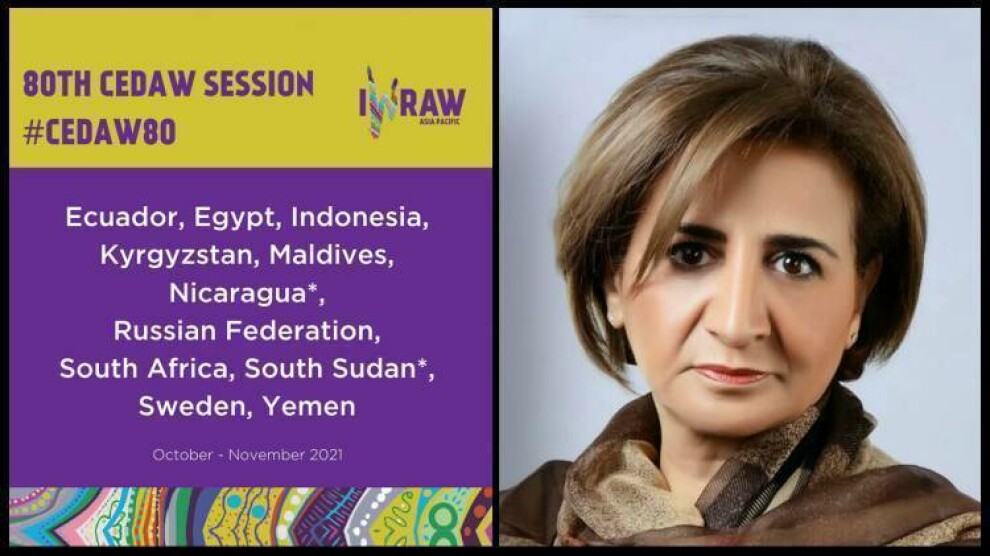Yemeni women participate in preparing CEDAW Shadow Report
61 representatives of institutions and NGOs headed by women held a meeting to participate in preparing CEDAW Shadow Report on the implementation of the Convention on the Elimination of All Forms of Discrimination against Women (CEDAW) in Yemen to be submitted to the 80th session of the CEDAW Committee. Amal Basha, the president of the Sisters Arab Forum for Human Rights (SAF), spoke to our news agency about the Shadow Report and said, “It is the result of a voluntary feminist effort that lasted for months.”

61 representatives of institutions and NGOs headed by women held a meeting to participate in preparing CEDAW Shadow Report on the implementation of the Convention on the Elimination of All Forms of Discrimination against Women (CEDAW) in Yemen to be submitted to the 80th session of the CEDAW Committee. Amal Basha, the president of the Sisters Arab Forum for Human Rights (SAF), spoke to our news agency about the Shadow Report and said, “It is the result of a voluntary feminist effort that lasted for months.”
NOOR SURIB
Yemen- Yemeni Feminist Movement keeps struggling for women’s rights achieved as a result of more than 30 years of struggle. While the civil war broke out in the country in 2014 has entered its seventh year, the country has suffered from many problems and women have had limited opportunities. But this situation doesn’t discourage women and they continue to knock on all doors in order to express their demands and suffer caused by the civil war.
Report prepared with the participation of 61 women
Female representatives of institutions and NGOs headed by women held a meeting to participate in preparing CEDAW Shadow Report on the implementation of the Convention on the Elimination of All Forms of Discrimination against Women (CEDAW) in Yemen. The report will be submitted to the 80th session of the CEDAW Committee. After several sessions, the report was approved by the institutions and NGOs and their names have been included in the report. The report includes many issues about the lives of Yemeni women and the shortcomings and marginalization that affected women between 2008 and 2020.
Rate of child marriage
The report highlights the increasing rate of child marriage, forced marriage, honor crimes, and female genital mutilation (FGM) in the country. Child marriage is one of the most dangerous harmful practices in the country, according to the report. “9% of girls were married before the age of 15, while 32% of girls were married before the age of 18. The percentage of child marriage has increased in the cities where displaced people live such as Al Hudaydah, Hajjah and Ibb. 72.5% of children were married before the age of 18 and 44.5% of children were married before the age of 15.”
The report also sheds light on violence against women, “Journalists, human rights defenders and political activists have been subjected to smear campaigns.”
Important recommendations in the report
The report contains many recommendations including the demand to enact a law to protect women and girls from all forms of violence. The women also demand in the report all laws that facilitate violence against women including those related to “honor killings” be amended. The provisions in the Penal Code also increase the vulnerability of women to violence, Article 232 of the Penal Code, which allows for reduced and lenient sentences for men convicted of so-called “honor killing” should be repealed, says the report.
“Yemeni women are citizens of this country”
We spoke to Amal Basha, the president of the Sisters Arab Forum for Human Rights (SAF), about the Shadow Report. “This report is the result of a voluntary feminist effort that lasted for months. It is the voice of Yemeni women, who face exclusion and marginalization. Those who read this report will feel the tragedy, sadness, and grief of the sharp decline in the rights of women. The achievement of equal justice and equality remains elusive nearly 40 years after Yemen ratified the convention on the elimination of all forms of discrimination against women,” Amal Basha told our news agency.
